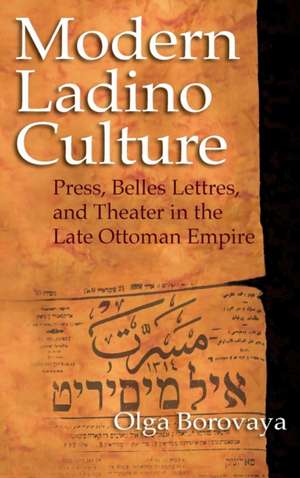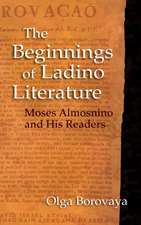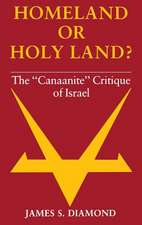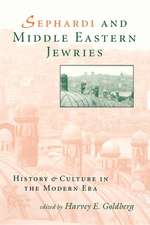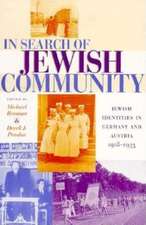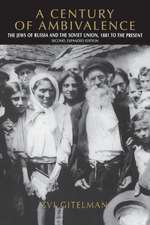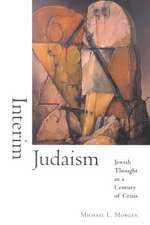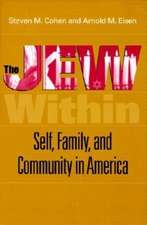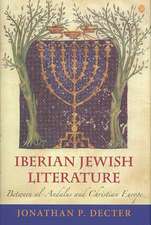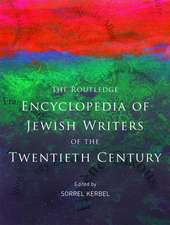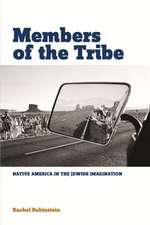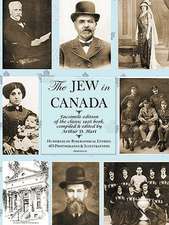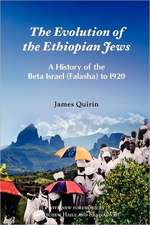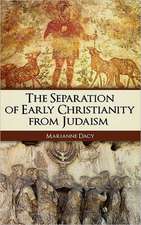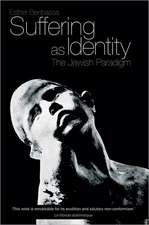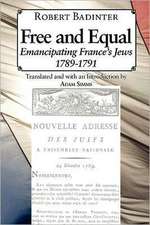Modern Ladino Culture – Press, Belles Lettres, and Theater in the Late Ottoman Empire: Indiana Series in Sephardi and Mizrahi Studies
Autor Olga Borovayaen Limba Engleză Hardback – 4 dec 2011
Vezi toate premiile Carte premiată
National Jewish Book Award (2011)
Preț: 261.79 lei
Nou
Puncte Express: 393
Preț estimativ în valută:
50.09€ • 52.30$ • 41.46£
50.09€ • 52.30$ • 41.46£
Carte tipărită la comandă
Livrare economică 04-18 aprilie
Preluare comenzi: 021 569.72.76
Specificații
ISBN-13: 9780253356727
ISBN-10: 0253356725
Pagini: 304
Ilustrații: 8 b&w illustrations
Dimensiuni: 157 x 236 x 24 mm
Greutate: 0.61 kg
Editura: Wiley
Seria Indiana Series in Sephardi and Mizrahi Studies
ISBN-10: 0253356725
Pagini: 304
Ilustrații: 8 b&w illustrations
Dimensiuni: 157 x 236 x 24 mm
Greutate: 0.61 kg
Editura: Wiley
Seria Indiana Series in Sephardi and Mizrahi Studies
Recenzii
"A superb literary-historical study of Ladino literature... that goes very far in fleshing out, correcting, and innovatively interpreting the history and substance of Ladino literary production." Sarah Abrevaya Stein, author of Making Jews Modern (IUP, 2003)
"This groundbreaking, eye-opening study demonstrates that literary and cultural analytical tools are key to answering historical questions about Ladino texts.... Borovaya's study underscores the richness of Ladino literature as a source for the history of Ottoman Sephardim and their diasporic offshoots." Aviva Ben-Ur, University of Massachusetts
"Olga Borovayas new book, Modern Ladino Culture, is the first to examine as a unified phenomenon three genres of Ladino cultural production: the press, belles lettres, and theater. Unknown in earlier periods of the Ottoman Jewish history, Borovaya identifies these genres as imports from the West which "took root among Ottoman Sephardim at the beginning of the twentieth century and developed within the context of the local culture." Randall C. Belinfante, Jewish Book Council
Olga Borovaya provides an innovative approach to the study of Ladino culture. An expert in romance philology, in recent years she has focused on the unique developments of its Judeo-Spanish expression, Ladino, the vernacular language used by the Sephardim. In this book, she examines the dramatic changes that occurred in Ladino culture during the late Ottoman period (mid-nineteenth to early twentieth centuries), instigated by the press This is a groundbreaking and comprehensive study of the modernization of the culture of a minority group. It examines the development of the Sephardi press and its impact on the emergence of Ladino belles lettres and the Sephardi theater. On the basis of exhaustive research, Borovaya combines enlightening analysis with detailed information in a study that provides an innovative approach to the study of Ladino culture and Sephardi history. In addition to scholars of Sephardi studies, this work is of tremendous importance for those interested in cultural developments among minority groups, and the interconnections among various cultural aspects. - Rachel Simon, H-Judaic
"A superb literary-historical study of Ladino literature... that goes very far in fleshing out, correcting, and innovatively interpreting the history and substance of Ladino literary production." Sarah Abrevaya Stein, author of Making Jews Modern (IUP, 2003) "This groundbreaking, eye-opening study demonstrates that literary and cultural analytical tools are key to answering historical questions about Ladino texts... Borovaya's study underscores the richness of Ladino literature as a source for the history of Ottoman Sephardim and their diasporic offshoots." Aviva Ben-Ur, University of Massachusetts "Olga Borovaya's new book, Modern Ladino Culture, is the first to examine as a unified phenomenon three genres of Ladino cultural production: the press, belles lettres, and theater. Unknown in earlier periods of the Ottoman Jewish history, Borovaya identifies these genres as imports from the West which "took root" among Ottoman Sephardim at the beginning of the twentieth century and developed within the context of the local culture." Randall C. Belinfante, Jewish Book Council "Olga Borovaya provides an innovative approach to the study of Ladino culture. An expert in romance philology, in recent years she has focused on the unique developments of its Judeo-Spanish expression, Ladino, the vernacular language used by the Sephardim. In this book, she examines the dramatic changes that occurred in Ladino culture during the late Ottoman period (mid-nineteenth to early twentieth centuries), instigated by the press... This is a groundbreaking and comprehensive study of the modernization of the culture of a minority group. It examines the development of the Sephardi press and its impact on the emergence of Ladino belles lettres and the Sephardi theater. On the basis of exhaustive research, Borovaya combines enlightening analysis with detailed information in a study that provides an innovative approach to the study of Ladino culture and Sephardi history. In addition to scholars of Sephardi studies, this work is of tremendous importance for those interested in cultural developments among minority groups, and the interconnections among various cultural aspects." - Rachel Simon, H-Judaic
"This groundbreaking, eye-opening study demonstrates that literary and cultural analytical tools are key to answering historical questions about Ladino texts.... Borovaya's study underscores the richness of Ladino literature as a source for the history of Ottoman Sephardim and their diasporic offshoots." Aviva Ben-Ur, University of Massachusetts
"Olga Borovayas new book, Modern Ladino Culture, is the first to examine as a unified phenomenon three genres of Ladino cultural production: the press, belles lettres, and theater. Unknown in earlier periods of the Ottoman Jewish history, Borovaya identifies these genres as imports from the West which "took root among Ottoman Sephardim at the beginning of the twentieth century and developed within the context of the local culture." Randall C. Belinfante, Jewish Book Council
Olga Borovaya provides an innovative approach to the study of Ladino culture. An expert in romance philology, in recent years she has focused on the unique developments of its Judeo-Spanish expression, Ladino, the vernacular language used by the Sephardim. In this book, she examines the dramatic changes that occurred in Ladino culture during the late Ottoman period (mid-nineteenth to early twentieth centuries), instigated by the press This is a groundbreaking and comprehensive study of the modernization of the culture of a minority group. It examines the development of the Sephardi press and its impact on the emergence of Ladino belles lettres and the Sephardi theater. On the basis of exhaustive research, Borovaya combines enlightening analysis with detailed information in a study that provides an innovative approach to the study of Ladino culture and Sephardi history. In addition to scholars of Sephardi studies, this work is of tremendous importance for those interested in cultural developments among minority groups, and the interconnections among various cultural aspects. - Rachel Simon, H-Judaic
"A superb literary-historical study of Ladino literature... that goes very far in fleshing out, correcting, and innovatively interpreting the history and substance of Ladino literary production." Sarah Abrevaya Stein, author of Making Jews Modern (IUP, 2003) "This groundbreaking, eye-opening study demonstrates that literary and cultural analytical tools are key to answering historical questions about Ladino texts... Borovaya's study underscores the richness of Ladino literature as a source for the history of Ottoman Sephardim and their diasporic offshoots." Aviva Ben-Ur, University of Massachusetts "Olga Borovaya's new book, Modern Ladino Culture, is the first to examine as a unified phenomenon three genres of Ladino cultural production: the press, belles lettres, and theater. Unknown in earlier periods of the Ottoman Jewish history, Borovaya identifies these genres as imports from the West which "took root" among Ottoman Sephardim at the beginning of the twentieth century and developed within the context of the local culture." Randall C. Belinfante, Jewish Book Council "Olga Borovaya provides an innovative approach to the study of Ladino culture. An expert in romance philology, in recent years she has focused on the unique developments of its Judeo-Spanish expression, Ladino, the vernacular language used by the Sephardim. In this book, she examines the dramatic changes that occurred in Ladino culture during the late Ottoman period (mid-nineteenth to early twentieth centuries), instigated by the press... This is a groundbreaking and comprehensive study of the modernization of the culture of a minority group. It examines the development of the Sephardi press and its impact on the emergence of Ladino belles lettres and the Sephardi theater. On the basis of exhaustive research, Borovaya combines enlightening analysis with detailed information in a study that provides an innovative approach to the study of Ladino culture and Sephardi history. In addition to scholars of Sephardi studies, this work is of tremendous importance for those interested in cultural developments among minority groups, and the interconnections among various cultural aspects." - Rachel Simon, H-Judaic
Notă biografică
Cuprins
Acknowledgements
Note on Translation, Transcription, Proper Names, and Dates
Introduction
Part 1. The Press
The Emergence of modern Culture Production in Ladino: The Sephardi Press
The Press in Salonica: a Case Study
Part 2. Belles Lettres
The Serialized Novel as Rewriting
Ladino Fiction: Case Studies
Part 3. Theater
Sephardi Theater: Project and Practice
Ladino Drama: Case Studies
Conclusion
Notes
Index
Note on Translation, Transcription, Proper Names, and Dates
Introduction
Part 1. The Press
The Emergence of modern Culture Production in Ladino: The Sephardi Press
The Press in Salonica: a Case Study
Part 2. Belles Lettres
The Serialized Novel as Rewriting
Ladino Fiction: Case Studies
Part 3. Theater
Sephardi Theater: Project and Practice
Ladino Drama: Case Studies
Conclusion
Notes
Index
Descriere
Explores the literary culture of the Ottoman Empires Sephardic Jews
Premii
- National Jewish Book Award Finalist, 2011
